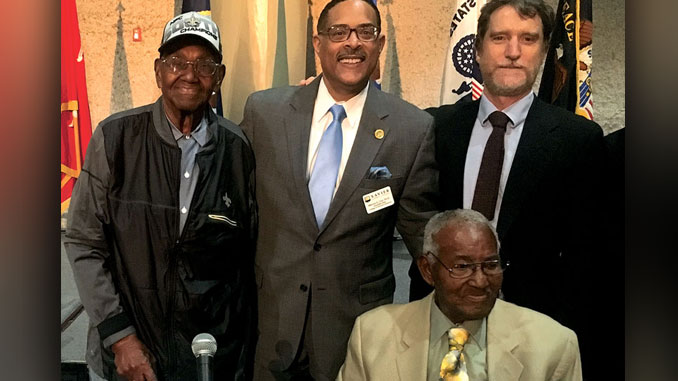
By Piper Thurman
As part of commemorating Black History Month across the City, the World War II Museum on Magazine Street convened a panel of historians on Feb. 21, 2018, to revisit what African-Americans faced during World War II.
“This is something that is really important,” said Marcus Cox, an Associate Dean at Xavier University of Louisiana. “We should understand why African-Americans fought in World War II and the significant impact these men had on the Black community,” Cox said.
Cox, an African-American Historian, and Charles Chamberlain, who served as the historian for the Louisiana State Museum, led the public discussion with two World War II Veterans who served in the U.S. Navy. New Orleans natives, Edward Lee Sr. and Lawrence Brooks were both drafted into the war in the 1940s and relived their experiences during this tumultuous time.
“I truly did not want to go, but I think you should go. Being in the war taught me a lot,” said Brooks, who was a cook during the war. “I learned so much, and stayed out of trouble,” Brooks said.
African-Americans were called on to help fight in the war shortly after The Great Depression ravaged across the United States, and New Orleans was one of a few places that suffered the worst aftermaths of the Depression, Cox said. While fighting for their own Civil Rights, African-Americans bravely fought and helped America and its allies win the war, Cox told the audience. Military base camps were still segregated, though. African-American soldiers and White soldiers ate separately and slept separately, yet when it was time to fight, both came together to meet the challenge given to them.
“Being in the war wasn’t always easy. We didn’t know if we were going to make it back home, we had a lot of hard times and we had a lot of good times,” Brooks said.
African-Americans were not paid a significant amount while fighting, either. Brooks recalled only making $21 a month. His camp was located right on a Japanese burial ground, which turned out to be a blessing in disguise, Brooks said. Bombs flew all throughout the bases, but his was never hit.
“When I found out we were located on Japanese burial grounds, I knew we were safe because the Japanese weren’t going to hit that,” Brooks said.
It was common then for the members of the U.S. Navy, as well as other Armed Forces Divisions to learn different crafts and professions while on active duty. African-Americans were taught how to cook, some worked as nurses, and some as mess attendants. It was there Edward Lee Sr. said he learned how to cook. He became the head cook, feeding soldiers and keeping them strong, which was just as important as actually fighting the war itself.
“I was responsible for making sure everyone had a meal. I got so good at my job, and I knew exactly what my captain wanted to eat when he wanted it,” Lee said.
Because he was the head cook, Lee said he made $71 a month.
Lee and Brooks were young men when they were drafted into the war, and although they did not want to go, it is where they became men. They learned how to fight and make a living with what they had during the war. It is important for Black youth to be educated about their history, and the contributions made by Black people, Lee told the audience.
“There were a lot more Blacks in the war, especially young people. Black youths should know how their people fought for this country. Respect was big back then. White, Black, yellow – no matter what color you were, we were all men, and we were all kings,” Lee said.
Recommended For You.



Be the first to comment